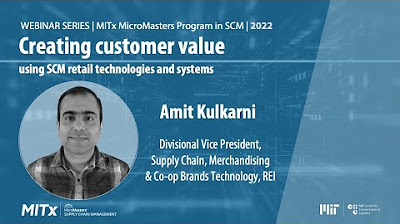Sustainability in Pharmaceutical Industry - Moderna
Summary
TLDR在这段访谈中,Raj Mishra,Moderna全球生命周期项目管理的高级经理,分享了他在供应链管理领域的丰富经验和对可持续性的深刻见解。Raj讨论了他在制药行业的工作,包括在供应链规划、物流、客户服务和项目管理方面的经历。他强调了在供应链中采取整体方法的重要性,包括社会可持续性、产品质量、数字化技术的应用,以及如何通过优化供应链和采用可再生能源等措施减少浪费和碳足迹。Raj还提到了他在医疗器械公司管理产品生命周期管理组合的经验,以及他如何通过在供应链中实施创新解决方案,对全球患者产生积极影响。此外,他还谈到了作为ISCA董事会成员的角色,以及他如何通过教育和指导下一代供应链专业人士来推动行业向更可持续的方向发展。
Takeaways
- 🌟 Raj Mishra 是 Moderna 全球生命周期项目管理的高级经理,拥有超过九年的供应链行业经验。
- 📚 Raj 在印度孟买长大,对科学有着浓厚的兴趣,这引导他完成了工程学士学位和运营管理硕士学位。
- 💼 Raj 的职业生涯始于供应链分析师,之后在 FMCG 和制药行业积累了丰富的经验。
- 🌐 在德克萨斯大学阿灵顿分校攻读硕士学位期间,Raj 学习了全球供应链的运作,并在一家医疗器械公司管理产品生命周期。
- 💊 Raj 在制药行业的工作经历使他对供应链网络的深入工作和解决方案的实施产生了浓厚兴趣。
- 🚀 Raj 最近加入了一家领先的 COVID-19 疫苗制造商,担任全球供应链职能,致力于对抗全球大流行。
- 🔄 制药公司通过优化供应链、减少浪费、使用环保包装材料,以及转向可再生能源等措施,致力于实现可持续性。
- 🤝 Raj 强调了供应链中跨部门合作的重要性,以及如何通过整合业务规划和 SNOP 流程来增强价值和环境可持续性。
- 🌱 Raj 认为持续创新在制造和包装操作中至关重要,需要有专门的供应链研发团队来消除浪费。
- 📈 作为 ISEA 董事会成员,Raj 参与讨论最佳实践,并在供应链技术会议上展示了如何通过正确的工具选择和流程来降低风险。
- 📚 Raj 还与领先的大学合作,作为供应链管理硕士课程的行业顾问委员会成员,为课程内容提供建议,并且是下一代供应链专业人士的导师。
Q & A
拉杰·米什拉在莫德纳公司担任什么职位?
-拉杰·米什拉在莫德纳公司担任全球生命周期项目管理的高级经理。
拉杰在供应链行业的工作经验有多少年?
-拉杰在供应链行业拥有超过九年的工作经验。
拉杰在哪些特定行业和角色中积累了经验?
-拉杰在制药行业积累了经验,担任过供应链分析师、供应链规划、物流、客户服务和项目管理等不同角色。
拉杰是如何对供应链领域产生兴趣的?
-拉杰在完成工程学士学位后,有机会进入供应链管理领域,从供应链分析师开始他的职业生涯。随着工作的深入,他对供应链的兴趣逐渐增长,特别是在参与一个与世界卫生组织相关的大型项目后,他对供应链网络的管理产生了浓厚兴趣。
拉杰在德克萨斯大学阿灵顿分校攻读硕士学位期间有哪些收获?
-在德克萨斯大学阿灵顿分校攻读硕士学位期间,拉杰有机会学习和理解全球供应链的运作方式,以及全球流程是如何工作的。他还有机会在一家医疗器械公司工作,管理广泛的产品生命周期管理组合,这为他提供了在全球范围内对患者产生影响的宝贵机会。
拉杰如何定义可持续供应链?
-拉杰认为,可持续供应链不仅仅是降低成本,提高效率,而是一个全面的方法。这包括确保产品及时供应、优化供应链、关注产品质量、减少浪费、减少碳足迹,并通过整合业务规划和SNOP(销售与运营计划)流程来提高价值和环境可持续性。
制药公司如何确保供应链的社会可持续性?
-制药公司通过专注于提供负担得起的药物和治疗给发展中国家和医疗系统较弱的国家,确保社会可持续性。他们还成立了专门的团队来处理这些国家的事务,并优化供应链以减少浪费和碳足迹。
拉杰在ISCA(国际供应链协会)中扮演什么角色?
-拉杰在ISCA中担任董事会成员的角色,参与讨论最佳实践,以及如何使供应链更加高效。他还有机会在供应链技术会议上发表演讲,并作为大学供应链课程的行业顾问,为课程内容提供建议。
拉杰在ISCA的演讲中提出了哪些关于供应链的观点?
-拉杰在ISCA的演讲中提出了通过正确的工具、平台和流程选择来降低风险的观点。他强调了IDP(集成需求规划)和SNOP(销售与运营计划)的重要性,并讨论了如何通过这些流程提高预测的准确性和在公司内部建立信任。
拉杰如何鼓励听众和观众参与ISCA的活动?
-拉杰鼓励听众和观众访问ISCA的网站,了解ISCA如何帮助他们,并从ISCA的课程中学习,这些课程对他们未来的职业发展可能非常有益。
拉杰在推动供应链可持续性方面有哪些建议?
-拉杰建议通过整合业务运营、与供应商合作、数据支持的全球供应链网络、战略性地规划制造和分销中心的位置、使用可再生能源、持续创新制造和包装操作,以及建立专门的供应链研发团队来推动供应链可持续性。
拉杰认为产品工程师和产品经理在供应链网络中扮演什么角色?
-拉杰认为产品工程师和产品经理应该是供应链网络的架构师,他们通过分析和改进流程来实现这一目标。他们需要采取协作方法,设计全球供应链操作,成为绿色供应链的倡导者,鼓励团队成员提出创新想法,并将这些想法转化为可执行的操作。
Outlines

This section is available to paid users only. Please upgrade to access this part.
Upgrade NowMindmap

This section is available to paid users only. Please upgrade to access this part.
Upgrade NowKeywords

This section is available to paid users only. Please upgrade to access this part.
Upgrade NowHighlights

This section is available to paid users only. Please upgrade to access this part.
Upgrade NowTranscripts

This section is available to paid users only. Please upgrade to access this part.
Upgrade NowBrowse More Related Video

Omera Khan: Building robust & resilient supply chains in today's dynamic business environment

Creating customer value using SCM retail technologies and systems

Leveraging supply chain optimization and visibility to achieve carbon reduction targets

Lean, Green, and Digital: Leveraging SCM Tools to Balance Complex Tradeoffs

Global Supply Chains: How Did All This Stuff Get Here?

Reimagining demand forecasting in the supply chain
5.0 / 5 (0 votes)
